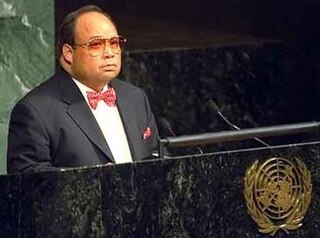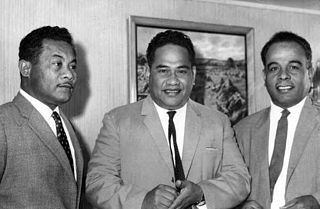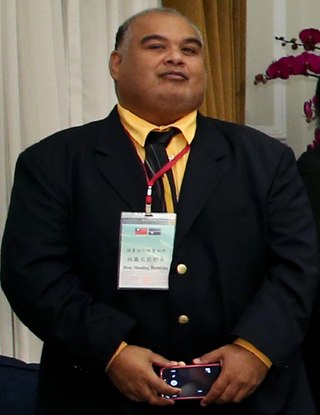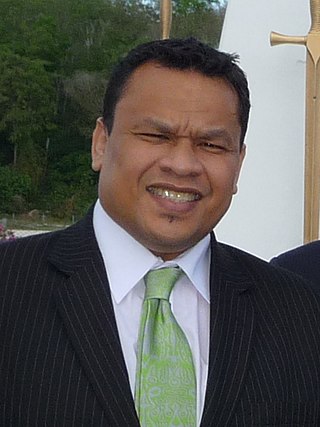
The politics of Nauru take place in a framework of a parliamentary representative democratic republic,whereby the President of Nauru is the head of government of the executive branch. Legislative power is vested in both the government and the parliament. The Judiciary is independent of the executive and the legislature.

RenéReynaldo Harris was President of the Republic of Nauru four times between 1999 and 2004. He was a Member of Parliament from 1977 to 2008.

Marcus Ajemada Stephen is a Nauruan politician and former sportsperson who previously was a member of the Cabinet of Nauru,and who served as President of Nauru from December 2007 to November 2011. The son of Nauruan parliamentarian Lawrence Stephen,Stephen was educated at St Bedes College and RMIT University in Victoria,Australia. Initially playing Australian rules football,he opted to pursue the sport of weightlifting,in which he represented Nauru at the Summer Olympics and Commonwealth Games between 1990 and 2002,winning seven Commonwealth gold medals.
Kennan Ranibok Adeang was a Nauruan politician who served as President of Nauru for three separate periods during the late 20th century. Born in Nauru,and educated in Australia,including at the Australian School of Pacific Administration,Adeang was first elected to the Parliament of Nauru in 1971,representing the seat of Ubenide,and became a noted opponent of Hammer DeRoburt,the country's first president. He first became president in 1986,serving two short terms at the end of that year. In the following year,1987,Adeang was involved in the establishment of the Democratic Party of Nauru,one of the first political parties in Nauru. He again served as president in late 1996,but lost power after a motion of no confidence. Adeang was active in parliament until 2000,serving at various times in the Cabinet,and also as Speaker from February 1997 to December 1998. In 2007,he was appointed High Commissioner to the Republic of Fiji,serving in the position until his death in 2011. His son,David Adeang,also served in the Nauruan parliament,occupying the same constituency as his father.

Raymond Gadabu was a Nauruan politician who served as Head Chief between 1953 and 1955.

Shadlog Armait Bernicke is a Nauruan politician.

Sprent Arumogo Dabwido was a Nauruan politician who served as the President of Nauru between 2011 and 2013,and was also a weightlifter. The son of a parliamentarian,Dabwido was originally elected to the Meneng Constituency in the Parliament of Nauru at the 2004 elections. Having served as Minister for Telecommunications in Marcus Stephen's government from 2009,Dabwido joined the Nauruan opposition faction in November 2011 after Stephen's resignation,and,having passed a motion of no confidence against interim president Freddie Pitcher,was elected president four days later. In his role as president,Dabwido functioned as chairman of the Cabinet of Nauru,and held various portfolios in the Nauruan government.
The Reverend Alfred Itubwa Amram was a Nauruan pastor and political figure.
Nauruan law,since Nauru's independence from Australia in 1968,is derived primarily from English and Australian common law,though it also integrates indigenous customary law to a limited extent. Nauruan common law is founded mainly on statute law enacted by the Parliament of Nauru,and on precedents set by judicial interpretations of statutes,customs and prior precedents.

Parliamentary elections were held in Nauru on 23 January 1971. As there were no political parties,all candidates ran as independents. Following the election,Hammer DeRoburt was re-elected president by members of the Parliament.

Parliamentary elections were held in Nauru on 18 December 1976. Following the election,Bernard Dowiyogo was elected President by Members of the Parliament.

Early parliamentary elections were held in Nauru on 12 November 1977,after Parliament had been dissolved by President Bernard Dowiyogo due to a sustained campaign against the government led by former President Hammer DeRoburt,who had been voted out of office the previous year. Particular controversy had been caused by the Supply Act passed in June,and Dowiyogo stated that elections would be held to give him a mandate. After Parliament failed to approve the budget,Dowiyogo asked Speaker David Gadaroa to dissolve the legislature.

Elections for the Legislative Council for the Territory of Nauru were held for the first and only time on 22 January 1966.

Elections for a Legislative Assembly were held in Nauru on 26 January 1968.
Tiakana Numanga was a Cook Islands politician. He served as a member of the Legislative Assembly between 1965 and his death and held several ministerial portfolios,including being Deputy Premier.

Joseph Detsimea Audoa was a Nauruan politician. He served as a member of the Parliament of Nauru and its predecessors from 1955 until his death and was a cabinet minister for much of the period 1968 to 1983.

James Ategan Bop was a Nauruan politician. He served as a member of Parliament and its predecessors from 1951 to 1955 and then from 1959 until his death,and was Minister of Finance for most of the period between 1968 and 1978.

Ludwig Dowong Keke is a Nauruan politician,diplomat,and dentist. Keke was Nauru's first university graduate. He worked as a dentist in Australia before returning to Nauru to enter politics by 1967,first being elected to the Constitutional Convention,and then to the Legislative Assembly. He served in the parliament until 1972. After 1977,he served as a dental officer in Western Australia. He then served as a dental officer for the South Pacific Commission in 1981. He returned to Nauru and served three terms in the parliament between 1986 and 2000,serving as speaker of parliament in his final term. By 2004,he was a diplomat to Fiji,and in 2007 he became the first Nauruan ambassador to Taiwan. He served in that capacity until 2016.
Samuel Edwin Tsitsi was a Nauruan politician.
The Nauru Local Government Council was a legislative body in Nauru. It was first established in 1951,when Nauru was a United Nations trust territory,as a successor to the Council of Chiefs. It continued to exist until 1992,when it was dissolved in favor of the Nauru Island Council.









